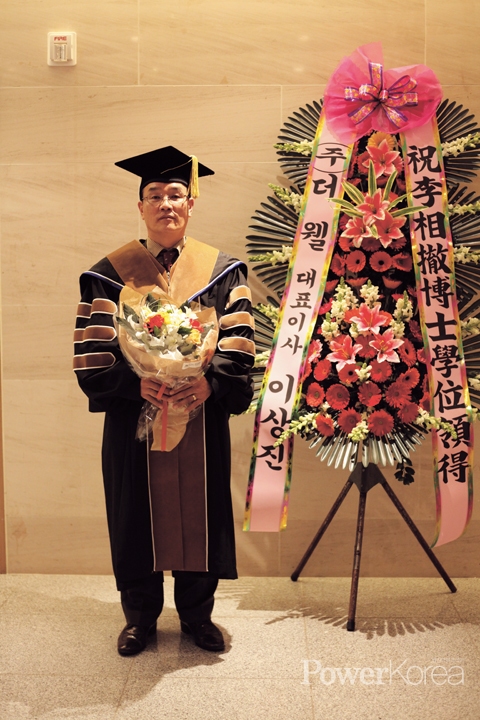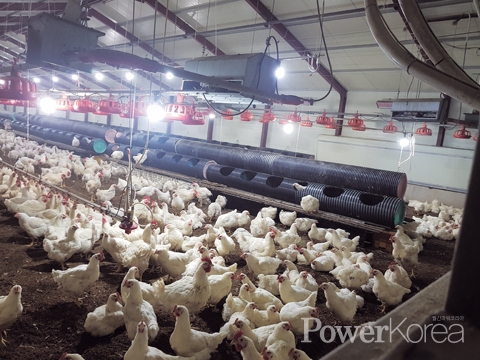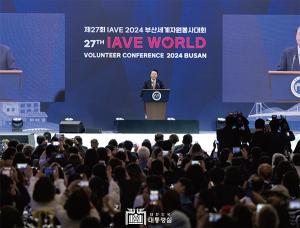 |
||
| ▲ CEO Lee Sang-chul | ||
It is reported that South Koreans consume yearly 540,000 tons of chickens of which 140,000 tons are imported. And it is interesting to know that most of the imported chickens are ‘parts’ of farmed super chickens shipped mainly from the US and Brazil. While farming super chicken is being a trend in the world, Korea still remains unit by unit farming each weighs around 1.5kg to 1.7kg due to Koreans’ love of a whole single chicken instead of parts. So, Lee Sang-chul, CEO of The Well rolled up his sleeves and took the initiative in spreading how cost-effective and healthy it is to farm super chickens.
The average weigh of chickens shipped out in the world is 2.2kg to 2.8kg; South Korea and Thailand 1.5kg to 1.7kg. The reason that the amount of imported chickens is increasing in Korea is because more and more people are buying parts of chicken instead of a whole chicken; increasing number of single households in Korea takes part for this. To sell chickens part by part is more economic and advantageous with large sized chickens.
Lee worked as a functional food researcher 10 years ago and developed a method that increased internal resorption rate of nutrients in the food before he jumped into a chicken research. After years of trials and errors, he developed subsidiary feed by mixing additives and it reduced amount of feed while strengthened growth. 1% to 2% subsidiary feed is mixed with assorted feed and it turns chicks to super chickens by growing bones and internal organs first and then putting on weight gradually.
The chicks weigh 1,205g in 3 weeks and 2kg after another week. Those that fed with Lee’s subsidiary feed weigh 4.5kg in 50 days to 55 days, and could weigh 5.5kg after 56 days. “They not only weigh more but grow healthy with minimum use of antibiotics. Also, they don’t have unique smell and the taste is good” adds CEO Lee.
Creating an ideal farming environment is as important as quality feed. The patented CNT hydrogen generator of Lee extended the time of dissolved hydrogen to 20 hours from that of normal generators which only last about 5 minutes. In other words, chickens drink as clean the water as we drink, eat as quality a feed as we eat fresh food.
“The yearly growth limitation of chickens is 5kg according to the US standard (US is the largest chicken exporters in the world). But using The Well’s method makes them 5kg within 2 months. In fact, it is still in the test phase but I expect that The Well’s method will possibly enable them to grow up to 13kg although the ideal weight is 5kg.”
One thing worth knowing is that The Well’s technology can be applied not only to chickens but also to almost all cattle and agricultural and marine products which have already been proved by tests; the tested pigs, ducks, cows, eels, catfish, onions and potatoes grew faster.
While the chicken industry in Korea is still reluctant to see its cost-effectiveness, The Well’s technology is being welcomed overseas; Lee has signed a contract with 10 countries for technology transfer and royalty.
With a clear vision in his head, Lee is preparing to open a large scale farming facilities on a 5,950,413 square meter land in Haenam County, South Jeolla Province; the facilities will include slaughterhouse, processing house and insects farm as well as housing complex, solar power plant and auxiliary facilities for the 6th industry (all in one management from production to distribution, marketing and selling).
“The farming will be backed up by continuous co-researches with professors on PAI (Pathogenic Avian Influenza) to make absolutely sure of hygiene and safety in all farming, packaging and distribution processes” says Lee.
 |
||
신태섭 기자 tss79@naver.com







